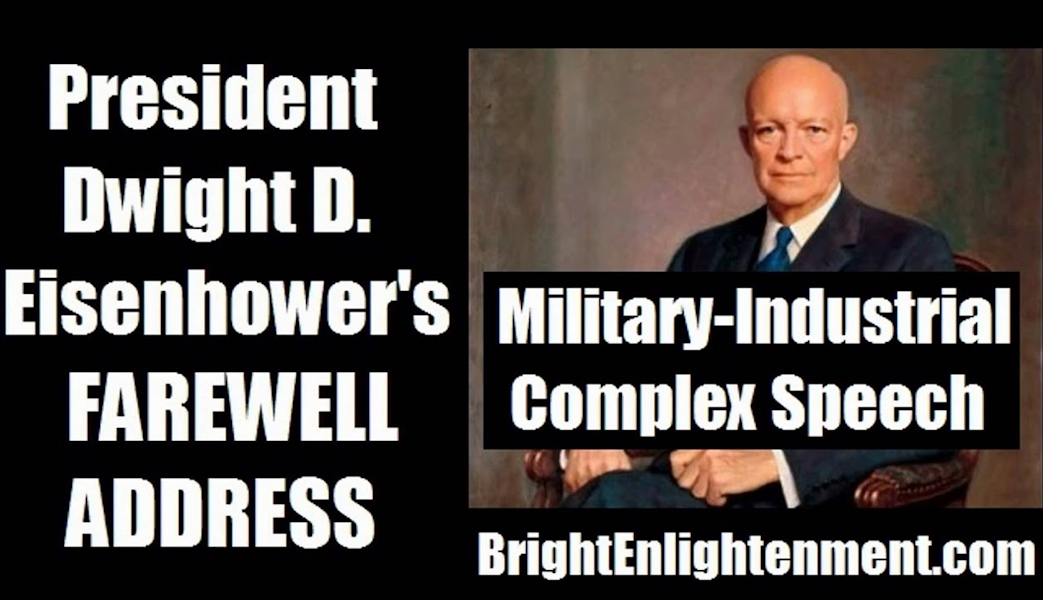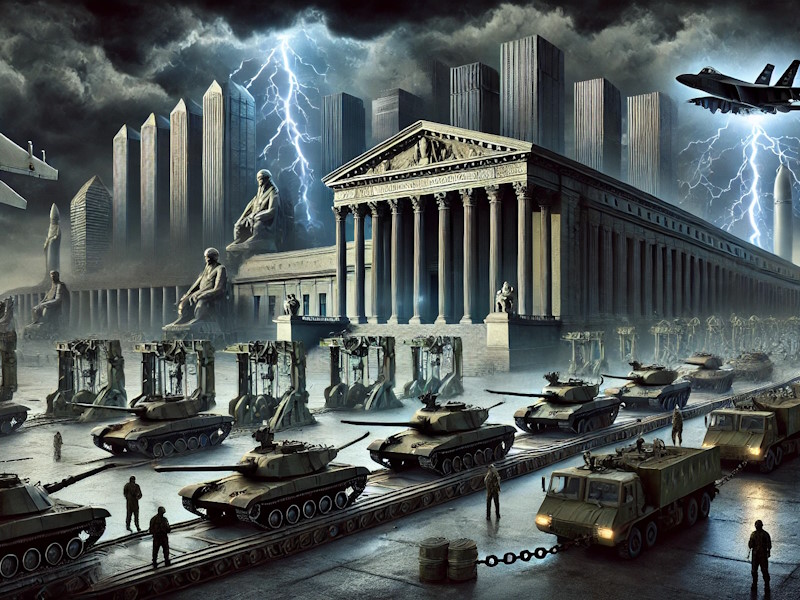Enablers of War and the Military-Industrial Complex:
The theory that central banks are institutional enablers of war and violence is rooted in their unique ability to create money out of thin air, allowing governments to finance wars without immediately burdening citizens through direct taxation. By bypassing the need for immediate public consent through tax increases, central banks effectively insulate governments from the political backlash that might arise if the true costs of war were made clear to the population. This practice has not only expanded the scale and frequency of wars but also fuelled the growth of military-industrial complexes around the world, echoing the sentiments of War is a Racket, Major General Smedley Butler's powerful critique of war profiteering.
"WAR IS A RACKET"
Profits Over People:
In War is a Racket,Smedley Butler exposes how wars are often fought not for defence or noble causes but for the financial gain of a few powerful elites. He emphasizes that while industries like munitions, steel, and banking profit immensely from war, the majority of citizens are left to suffer the consequences, both in terms of human lives and financial burdens. Central banks play a pivotal role in this "racket" by enabling governments to borrow massive sums of money to fund military operations, enriching the corporate and financial sectors while deferring the economic burden onto future generations.
The absence of direct taxation as a funding mechanism for wars hides the true costs from the public, preventing immediate backlash. This detachment from the financial reality of warfare has allowed countries to engage in prolonged conflicts, often without a clear justification or end goal. The public only feels the financial impact over time through inflation, national debt, and economic instability - effects that central banks help to obscure in the short term.
THE GENESIS OF CENTRAL BANKS:
The Bank of England and the Business of War:
The creation of central banks is deeply intertwined with the need to fund wars. The Bank of England, established in 1694, was born out of the British monarchy’s desperation to finance William III’s ongoing wars against France under Louis XIV. Faced with the collapse of previous financial systems, particularly the goldsmiths who had been reluctant to lend after King Charles II’s "Stop of the Exchequer," William III needed a new source of capital. The Bank of England was created as a joint-stock company specifically to lend the government £1.2 million, with the promise of an 8% return on investment.
This marked the beginning of a long relationship between central banking and war financing. Over the following centuries, the Bank of England’s primary function became raising funds for Britain’s numerous military campaigns. From the War of Spanish Succession (1701–1714) to the Napoleonic Wars (1803–1815) and beyond, the Bank of England’s ability to create money and manage public debt allowed Britain to wage war on an unprecedented scale. The model set by the Bank of England would inspire the creation of central banks in other nations, each playing a similar role in financing military expansion. Bank of England - Wikipedia
THE LEGACY OF WAR FINANCING:
Britain's Consols and the Napoleonic Debt, Finally Redeemed After 200 Years:
One of the oldest war bonds in history were the British Consols, a form of perpetual bond issued by the British government. These bonds were first introduced in 1751 but became especially significant during the Napoleonic Wars (1803–1815), when Britain needed to finance its vast military campaigns against France. Rather than paying off the debt immediately, the government opted to refinance it, turning the obligations into long-term bonds that paid interest indefinitely. These Consols symbolized the British government's reliance on public borrowing to fund wars, and they remained outstanding for over two centuries. It wasn’t until the Finance Act of 2015 that the British government finally redeemed the last of these Consols, bringing an end to one of the longest-standing war debts in history. The redemption of these bonds marked the closing chapter of Britain's financial legacy from the Napoleonic era, underscoring the enduring impact of war financing on public debt.
British Consols were widely held by a diverse group of investors, including individuals, institutions, and governments, due to their status as government-backed securities. Some of the main holders of British Consols included:
- Private Investors: Many wealthy individuals and families purchased Consols as a safe and reliable investment, given that the bonds were backed by the British government and paid regular interest indefinitely. Consols were popular among aristocrats and landed gentry who sought secure, long-term income streams.
- Financial Institutions: Banks, insurance companies, and pension funds were significant holders of Consols. These institutions valued the steady and predictable income Consols provided, making them ideal for meeting long-term obligations like pension payments.
- Trusts and Charities: Trusts and charitable organizations also held Consols due to their low risk and steady returns. Many philanthropic funds invested in Consols as a way to generate regular income for their operations and charitable endeavors.
- Foreign Governments and Investors: Consols were seen as a benchmark for safety and stability, and foreign governments, along with international investors, often held them as part of their reserves or investment portfolios. The reputation of the British Empire as a stable economic power made British government bonds attractive to overseas investors.
Throughout the centuries, British Consols were regarded as a bedrock of financial stability, making them a popular choice for conservative, income-seeking investors. Their redemption in 2015 marked the end of an era in British finance.
FUNDING BOTH SIDES:
Banks and War Profiteering:
One of the most controversial aspects of central banks and private financial institutions during times of war is the practice of funding both sides of a conflict. Throughout history, it has been well-documented that banks have often provided financial support to both opposing nations in a war, profiting from the debt incurred by all sides. This practice is particularly evident in the Napoleonic Wars, when the Rothschild banking family is believed to have provided loans to both Britain and France, ensuring that no matter the outcome, the banks would emerge wealthier.
This dual financing demonstrates the ultimate detachment of financial institutions from national interests or moral considerations. Banks are incentivized to support war, regardless of its causes or outcomes, because they profit from the enormous borrowing that war requires. Central banks, by facilitating this borrowing on a national scale, become complicit in the continuation of conflicts, even when peace might be a more economically and socially responsible choice. This dynamic has enabled conflicts to persist and escalate, driven by the financial motivations of those who stand to gain from war.
What If Governments Had to Raise Taxes to Fund Wars?
If governments were required to raise taxes every time, they wanted to fund a war, the political landscape would likely look very different. The public would be immediately aware of the costs of war, and leaders would face far greater scrutiny before engaging in conflict. The act of raising taxes is unpopular, and citizens would demand a clear and compelling reason for why their money is needed to fund military action. In such a scenario, it’s likely that many wars would be avoided altogether, as the public would resist the financial burden.
Historical examples support this idea. In the Vietnam War, growing awareness of the human and economic costs led to widespread opposition and protests. The war was funded through borrowing, but the economic strain eventually became evident. Had the costs of Vietnam been financed through immediate taxation, the resistance to the war might have emerged even earlier. Today, modern wars, such as those in Iraq and Afghanistan, have been largely financed through borrowing, allowing them to continue for decades without widespread financial consequences being felt immediately by the public. Forbes: Central Banking's Connection To Warfare Is Intimate

THE MILITARY-INDUSTRIAL COMPLEX:
Fed by Central Banks and Borrowed Money:
The ability of governments to finance wars without direct taxation has also allowed the military-industrial complex to thrive. The term, coined by U.S. President Dwight D. Eisenhower in his 1961 farewell address, refers to the close relationship between a country’s military and the private industry that supplies it with weapons and technology. Eisenhower warned that the unchecked power of this alliance posed a threat to democracy, as the financial interests of defence contractors could drive national policy toward perpetual war.
https://youtu.be/Gg-jvHynP9Y?si=qjkL8tYKSb68eR7S
Central banks play a crucial role in this dynamic. By providing governments with the ability to borrow money cheaply, they enable the continuous funding of defence contracts, military technology development, and weapons manufacturing. The scale of military spending, particularly in the U.S., has grown exponentially, with the U.S. defence budget exceeding $800 billion annually. This would not be possible without the central banking system and the ability to borrow money to finance these expenditures.
THE HIDDEN COSTS:
Inflation, Debt, and the Erosion of Public Welfare:
While central banks enable governments to avoid immediate taxation to fund wars, the costs eventually manifest in other forms, particularly through inflation and national debt. As governments borrow and print money to finance military conflicts, the value of the currency is diluted, leading to higher prices for everyday goods. Inflation disproportionately affects lower- and middle-income citizens, who see their purchasing power eroded as the cost of living rises.
In addition to inflation, the accumulation of national debt burdens future generations with the responsibility of repaying the costs of past wars. The U.S., for example, has incurred trillions of dollars in debt as a result of the wars in Iraq and Afghanistan. The interest on this debt consumes a significant portion of the national budget, diverting funds away from essential public services such as education, healthcare, and infrastructure. Central banks, by facilitating this borrowing, enable governments to avoid making difficult decisions about national priorities, deferring the financial reckoning to future generations.
A WORLD WITHOUT CENTRAL BANKS:
Less War, More Accountability?
If central banks did not have the power to create money out of thin air, governments would be forced to make more transparent financial decisions, particularly regarding military action. The immediate financial burden of war would fall on citizens through increased taxes, making it harder for governments to justify conflicts. The public would demand a clearer rationale for military engagements, and the economic realities would force leaders to weigh the costs and benefits of war more carefully.
In this alternative scenario, the military-industrial complex would shrink, as governments would be less able to sustain perpetual military expansion without public support. Citizens, more aware of the true costs of war, would likely resist efforts to engage in unnecessary conflicts, leading to a more peaceful global landscape. The reduction in military spending could also free up resources for social programs, education, healthcare, and other areas that directly benefit the population.
Central Banks, War, and the Cycle of Debt:
Central banks, since their inception, have played a pivotal role in enabling governments to finance wars without the immediate financial consent of their citizens. From the creation of the Bank of England to fund William III’s wars in 1694 to modern conflicts financed by the Federal Reserve and other central banks, these institutions have been integral to the military-industrial complex. The ability to create money and manage national debt has allowed wars to proliferate, often enriching a small group of elites at the expense of the broader population. As Smedley Butler aptly noted in War is a Racket, the real beneficiaries of war are not the soldiers or citizens, but the industries and financiers who profit from conflict.
Without the ability to finance wars through central banking, governments would be forced to rely on direct taxation, making the costs of war immediately visible to the public. In such a world, wars would likely be fewer and more carefully considered, as the financial burden would fall directly on the people who would demand accountability. Central banks, by enabling governments to obscure the true costs of war, have not only perpetuated conflicts but also fuelled a system of perpetual debt that continues to shape global politics and economics.


